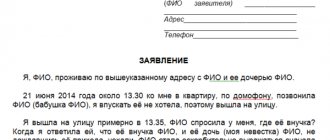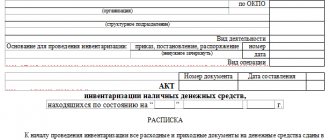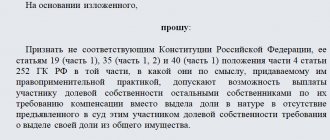Dissemination of information that does not reflect the real state of affairs and discriminates against a person (group of persons), defaming his good name or reputation, is a criminal offense, for which corresponding liability is provided. But in order to punish the perpetrator for slander and protect his good name, a citizen will have to make a lot of effort, since filing a complaint will require evidence, which is not always easy to collect in such a delicate situation. It is important to correctly prepare such a document, taking into account all the nuances and requirements of the law.
What can you complain about?
Not every case of dissemination of false information can become a basis for filing a complaint. The law clearly outlines the list of ways in which such information should be disseminated. In particular, a complaint for libel can be filed provided that the data became known to the general public through:
- information message on television or radio;
- The media and the Internet where the material was published;
- demonstrations on television;
- an oral message communicated by one person to another person;
- placement of information in a public report, characterization or statement addressed to a certain circle of citizens or an official.
At the same time, a violation can be classified under a more “severe” article if there are such aggravating circumstances:
- when a person took advantage of his status or official position to spread slander;
- the general public has become aware of a serious illness that is dangerous to others;
- the subject of public discussions was information about the commission of a serious criminal act by a person, which does not have official confirmation;
- dissemination was made in the form of public expression (for example, through the use of a literary work, report, etc.).
Attention! The statute of limitations for disseminating libel in the media is 1 year.
When is it necessary to write a counter-report to the police for libel?
Liability for libel is provided for in the criminal legislation of our country.
The victim has the right to file an application under Article 128.1 of the Criminal Code of the Russian Federation. The commission of this illegal act means the dissemination of information about a person that discredits his honor and dignity, since it does not correspond to reality. In addition to the standard situation where one person will slander another, it is also possible that a citizen is deliberately accused of something he did not do. In such a situation, it is necessary to protect your rights, for which you write a counter-statement against the applicant.
The refutation is submitted to the same authority where the initial appeal was submitted. It is worth noting that the legislator provides the opportunity to contact the police, prosecutor's office or court. The submitted counter-complaint and the original application will be considered by authorized persons within the same process.
In order to refute slander, you will need to draw up a paper in accordance with all existing rules. It is also necessary to indicate the evidence on the basis of which you will refute the accusation. In this situation, it is best to contact a professional lawyer who will help you draw up a statement, select the necessary evidence and defend your interests in court.
Formation of the evidence base
If you find yourself a victim in relation to whom unpleasant rumors or speculation have been illegally spread, a citizen must first try to collect a convincing evidence base, the quality of which will determine the decision on the complaint. This is extremely relevant if, as a result of such an act of another person, the victim experienced severe stress, as a result of the unrest his health sharply deteriorated, or he suffered financial losses (for example, due to reputational losses), compensation for which he wants to achieve forcibly.
Important! The refusal to initiate a criminal case still leaves the victim the right to file a civil claim and seek compensation for moral and/or material damage.
To protect your reputation and good name, you will need to create the following evidence base:
- prepare documents that indicate that the information being disseminated is not supported by any facts. And the more such materials there are, the easier it will be to initiate a criminal case and obtain monetary compensation for losses;
- indicate the presence of a motive for committing such a crime. In most cases, the person who commits such an act has a personal interest and does it for some purpose (for example, out of personal enmity, to lure clients to himself, etc.).
Use of testimony
The presence of witnesses can largely determine the outcome of a case when the task is to bring the offender to justice for disseminating knowingly false information. Their testimony will play a big role in court, where they will be invited to testify. Witnesses can be friends, neighbors, relatives or work colleagues who were direct participants in the conflict or its involuntary spectators.
If the incident occurred on the street or in a public place where the victim had no acquaintances or friends, it is necessary to try to find witnesses and negotiate with them to testify. Due to the fact that this is not always realistic, in such situations it is better to immediately exchange contact information with passers-by in order to be able to turn to them for help and support upon immediate request.
When it is not possible to attract witnesses
The victim should not neglect to use available technical means to record the facts of the spread of slander. This can be done using an audio player, voice recorder or mobile phone and then attach such material to the complaint as evidence of an offense.
If unreliable information about a citizen has become available to the public through a video/audio recording or a written source, then a linguistic examination can be carried out to attach the expert’s opinion to the compiled document. With its help, it will be possible to identify the guilty person and achieve his punishment even in the absence of witnesses.
Rules for filing a claim
The writing is subject to statutory requirements set out in Art. 131 Code of Civil Procedure of the Russian Federation, art. 125 Arbitration Procedure Code of the Russian Federation. A claim for the protection of business reputation is filed against the investigative and inquiry authorities in writing. The structure of the document consists of several parts:
- Introductory (you should indicate the name of the court, the parties involved in the case, contact information, the amount of the claim and the amount of the state duty).
- Descriptive (states the grounds for the dispute).
- Reasoning (references are made to the applicable rules of law, clauses of the contract or other agreements between the parties, depending on the complexity of the dispute, judicial practice with a similar subject of the dispute is indicated).
- Final (the plaintiff indicates the requirements, the list of attached documents is determined, the authorized representative of the plaintiff signs the document, the date is indicated).
The text is presented in an official business style. Use abbreviations for long names, having previously identified them. For example: Federal Law No. 228-FZ of July 27, 2010 (hereinafter referred to as Federal Law No. 228). Visually, bulkiness is removed and the meaning is not lost. Indicate only those circumstances that are relevant to the case. There are no mandatory text formatting requirements, but we recommend using a font size of at least 12, 1.5 spacing, sequential page numbering, and Times New Roman or Calibri font.
When writing, divide the text into paragraphs. When reading, the perception of information will be most optimal and will allow you to divide the structure into certain blocks. Bold text is used to emphasize attention. But we recommend not to abuse it and use it in moderation.
How to file a complaint
Considering the seriousness of the charges and the possible consequences for the violator (up to criminal punishment), when contacting the Police or the Prosecutor's Office, it is necessary to correctly draw up a complaint, which can be written according to the following example:
In addition to generally accepted requirements, it is important to consider the following rules for drawing up a document:
- In the text of the appeal, you should first briefly describe the circumstances and conditions under which false and defamatory information was disseminated about the victim (when an article was published in a newspaper, the content of which is slander, on which Internet resource the content was posted, at which conference the insults were made addressed to the victim, etc.). It is important to indicate as much initial data as possible so that during the investigation, an employee of the regulatory authority can easily familiarize himself with such material and verify the validity of the applicant’s claims;
- If there is a specific person whom the victim suspects of involvement in the spread of slander, then in the complaint you must write down any information known about him that can be used to identify him (the same is true if the act was committed by a group of people);
- A claim for slander must indicate the reason for such an act. The main motive for disseminating unpleasant information is personal motives or material interest. The reason must be sufficiently convincing (for example, personal hostility caused by a previously arising conflict between the parties, a desire to cause damage to the victim’s business, etc.), otherwise the initiation of a criminal case and monetary compensation will be denied. Such a decision will be made even if the citizen does not indicate such information, believing that this will not affect the decision based on the results of consideration of the application for slander;
- It should be clearly formulated what consequences the violator’s slander resulted in for the victim: deterioration of health, reduction in the revenue of his outlet, etc. It is preferable to confirm this information with relevant materials (for example, it could be an extract from the medical history), especially if it is subsequently filed claim for monetary compensation for moral and material damage;
- If the applicant managed to find witnesses to the incident and obtain their consent to testify, this can also be indicated in the text of the document;
- It is important to clearly outline your requirements and provide references to regulations that were violated due to the act of a third party;
- At the end of the document there should be a detailed list of materials that the citizen plans to transfer as evidence of violations of the law.
Important! If a complaint for slander is drawn up carelessly and without observing the specified rules, the claims contained in it will be denied.
What is the crime
Creating and disseminating deliberately false information about facts from the life of another person with the aim of harming him is the brief essence of the crime. It should be distinguished from defamation, which is a mixture of fiction and truthful information, while slander is deliberately false.
To make punishment for slander possible, the information must be:
- false;
- cause moral suffering, humiliation, and infringement of rights.
For example, wanting to take a higher position, a colleague spreads rumors that the person occupying it was caught in theft or theft, and cases of theft of material assets of employees began to appear in the company. In such a situation, we can talk not only about moral suffering, but also about real damage caused by dismissal.
Due to the popularization of the Internet, distributing any information is not difficult. This method is actively used in quarrels between spouses, friends and other people who have certain social connections with each other. However, it is difficult to find acceptable evidence of the dissemination of such information.
Representatives of law enforcement and other agencies that protect the law stand apart. There is a special article for slander and insult against them.
Where to go
Having prepared the necessary legislative framework, a citizen can apply to the following authorities:
- Police.
- Prosecutor's office
- Magistrate's Court.
Before filing a defamation claim, it is important to impartially assess your chances of satisfying the stated claims and consolidate a sufficient amount of evidence. If the victim does not have the opportunity to attract witnesses or document the fact of dissemination of unpleasant information, then it is better to abandon this idea or seek help from an experienced lawyer who will tell you how to act correctly in the current situation in order to punish the culprit and receive financial compensation for the damage caused.
Important! If the Police or Prosecutor's Office refuse to initiate a criminal case, the accused will be able to go to court to file a counterclaim to protect his honor and dignity.
Police
You can file a complaint for slander at any police department, based on information about the location of the nearest territorial unit of the Ministry of Internal Affairs of the Russian Federation/district. Despite the fact that you can draw up such a document directly at the place of application, using the help of the police department on duty, it is better to do this in a calm environment so as not to forget to indicate important details and nuances. Read more: Complaint to the Police
Along with the claim, the duty officer is provided with additional materials and evidence according to the inventory it contains. And the applicant himself is informed “on signature” of responsibility for false denunciation. If the complaint is accepted, a corresponding notification coupon is issued, so there is no need to bring several copies of the document to the police department.
After studying all the stated facts and evidence, the Police may initiate a criminal case or refuse to satisfy the citizen’s demands.
The period for consideration of the case can be no more than 10 days, but if there are compelling reasons, it can be extended after notifying the applicant. Subsequently, the case is transferred to the magistrate for consideration on the merits of the issue.
Prosecutor's office
Due to the fact that the Prosecutor's Office has the right to bring the offender to justice without a trial, a citizen who is dissatisfied with the spread of slander against him can file a complaint with this law enforcement agency. In some cases, a representative of the Prosecutor's Office can even represent the interests of the victim in court, acting as a public prosecutor. In this case, the victim will be able to receive monetary compensation for the harm caused to him.
The prosecutor's office does not issue notification coupons confirming the fact that applications have been received. In this regard, the citizen should take with him two copies of the document, on one of which the authorized employee will mark acceptance. This can be done in your territorial division of the Prosecutor's Office, guided by https://genproc.gov.ru/contacts/map/.
Magistrate's Court
To protect his good name and reputation, a citizen can file a claim in the Magistrates' Court. To do this, you will need to use another document, which can be drawn up according to the sample.
You will also have to pay a state fee, which is a mandatory condition for considering such cases.
Three copies of the application are submitted to the court office, each of which is accompanied by a separate package of additional materials (if original documents are transferred, then after the end of the process they are issued to the plaintiff who transferred them). One of the advantages of legal proceedings is the opportunity, in the shortest possible time and without the participation of other authorities, to receive monetary compensation for damage caused due to the spread of slander by a third party.
What applications are needed?
One application is not enough for the court to make an appropriate determination to accept and begin preparing the case. Article 132 of the Code of Civil Procedure of the Russian Federation establishes a list of required documents. Among them are the following:
- a receipt, payment order or other document confirming payment of the state fee;
- a claim for compliance with the pre-trial procedure for resolving a dispute and a receipt confirming its sending;
- documents referred to in the text of the claim (magazines or other publications disseminating information);
- calculation of the amount to be collected;
- receipt of dispatch of the claim (the applicant has the right to provide another document confirming the sending or delivery of the application along with the attached documents, for example, a notice on Form 119).
If the document is signed by a representative, proof of his authority must be attached. For example, when filing a claim against the tax authorities for the protection of business reputation, a power of attorney, a decision on appointment or an internal order of the organization is attached. For the arbitration process, the list of documents is established by Art. 126 Arbitration Procedure Code of the Russian Federation. For legal entities, it is mandatory to provide an extract from the Unified State Register of Legal Entities, a certificate of registration as an individual entrepreneur or a legal entity.
Let's consider an example of writing a claim under Article 152 Part 1:
| To the Savelovsky District Court of Moscow 125196, Moscow, st. Butyrsky Val, 7, building 1 Plaintiff: Ivanova Tatyana Ivanovna Registration address: 191000, St. Petersburg, st. Ulichnaya, 1, apt. 1 SNILS 000-000-000 00, Phone 8000000000 Defendant: State budgetary educational institution additional education for children specialized children's and youth sports school of Olympic reserve "Allur" OGRN 1234567890123 Address: 000000, Moscow, 3rd budget passage, 1 State duty: 00,000 rubles Statement of claim for protection of business reputation The plaintiff was the director of the State Budget Educational Institution of Children's and Youth Sports School "ALLUR". By order of dismissal dated 00.00.0000, the plaintiff was dismissed on 00.00.0000 from the specified position due to the expiration of the employment contract. 00.00.0000 an article with the title “Title” was posted on the social network “Name”. The article was posted in the official group of the defendant. The article contains a negative characterization of the plaintiff, which has no confirmation; it discredits the honor, dignity and business reputation of the plaintiff. The article material is attached to the statement of claim. As a result of the defendant's dissemination of this information, unfavorable consequences occurred for the plaintiff, namely: dismissal from a new job, which is confirmed by the materials attached to the case. As a result, income is lost. According to para. 1 clause 1 art. 152 of the Civil Code of the Russian Federation, a citizen has the right to demand in court a refutation of information discrediting his honor, dignity or business reputation, unless the person who disseminated such information proves that it is true. According to paragraph 2 of Art. 152 of the Civil Code of the Russian Federation, information discrediting the honor, dignity or business reputation of a citizen and disseminated in the media must be refuted in the same media. According to paragraph 5 of Art. 152 of the Civil Code of the Russian Federation, if information discrediting the honor, dignity or business reputation of a citizen turns out to be available on the Internet after its distribution, the citizen has the right to demand the removal of the relevant information, as well as a refutation of this information in a way that ensures that the refutation is communicated to Internet users. Based on the above and guided by Art. 152 Civil Code of the Russian Federation, art. 131-132 of the Civil Code of the Russian Federation, please:
Applications:
00.00.2020 Plaintiff Ivanova T.I. __________________ |
Sample:
The legislative framework
To punish the violator and bring him to the responsibility provided for by law, one should rely on the following legislative acts:
- Federal Law "On the Prosecutor's Office of the Russian Federation" N 2202-1-F dated January 17, 1992. (as amended on July 29, 2017).
- Federal Law “On the procedure for considering appeals from citizens of the Russian Federation” No. 59-FZ dated May 2, 2006.
- Civil Code of the Russian Federation N 14-FZ dated January 26, 1996. (as amended on March 28, 2017).
- Criminal Code of the Russian Federation N 63-ФЗ dated June 13, 1996. (as amended on July 18, 2017).
- Code of the Russian Federation on Administrative Offenses N 195-FZ dated December 3, 2001. (as amended on July 29, 2017).









